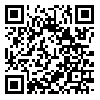Volume 13, Issue 4 (volume, Issue 4 2020)
2020, 13(4): 73-87 |
Back to browse issues page
Download citation:
BibTeX | RIS | EndNote | Medlars | ProCite | Reference Manager | RefWorks
Send citation to:



BibTeX | RIS | EndNote | Medlars | ProCite | Reference Manager | RefWorks
Send citation to:
malekshahi beiranvand F, khodabaksh pirkalani R, khosravi Z, ameri F. Investigate of the efficacy of death awareness- based intervention on panic disorder and death anxiety and to compare it with cognitive-behavioral intervention. Research in psychological health 2020; 13 (4) :73-87
URL: http://rph.khu.ac.ir/article-1-3670-en.html
URL: http://rph.khu.ac.ir/article-1-3670-en.html
1- Department Of Psychology, Faculty of Education and Psychology, university of Alzahra, Tehran, Iran. , f.malekshahi@alzahra.ac.ir
2- Department Of Psychology, Faculty of Education and Psychology, university of Alzahra, Tehran, Iran.
2- Department Of Psychology, Faculty of Education and Psychology, university of Alzahra, Tehran, Iran.
Abstract: (8949 Views)
The purpose of the present study is to investigate the impact of adding death-based intervention to cognitive-behavioral therapy on symptoms of panic and death anxiety among patients with panic disorder. It is also compared with cognitive-behavioral therapy for panic disorder as usual treatment. The research population comprised female patients with panic disorder referred to one of the psychiatric and counseling centers to treat in Qom city in 2019. Due to the limitation of the statistical population, the samples were selected through available sampling technique. The clients were interviewed by the researcher in addition to the psychiatrist's diagnosis. The total number of patients had cooperated in the research were 10, 11 and 9 in the first experimental group , second experimental group and control group, respectively. Templar Death Anxiety Scale, Anxiety Sensitivity Questionnaire were used for gathering information. The collected data were analyzed by repeated measures ANOVA.The results showed that the mean score of death anxiety and panic symptoms for both groups of the post-test and follow-up in death awareness-based intervention were significantly lower in comparison with the cognitive-behavioral and the control groups. According to the research findings, it seems that treatment of panic disorder would be more effective by reducing or eliminating death anxiety simultaneously. In addition, it would be reduced the risk of recurrence.
Type of Study: Research |
Subject:
Special
Received: 2020/02/24 | Accepted: 2020/03/17 | Published: 2020/03/17
Received: 2020/02/24 | Accepted: 2020/03/17 | Published: 2020/03/17
Send email to the article author
| Rights and permissions | |
 | This work is licensed under a Creative Commons Attribution-NonCommercial 4.0 International License. |






